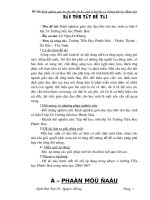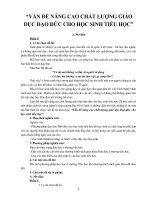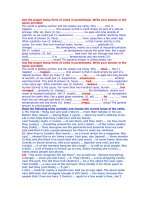SKKN đảo NGỮ INVERSION EXERCISES KEYS
Bạn đang xem bản rút gọn của tài liệu. Xem và tải ngay bản đầy đủ của tài liệu tại đây (70.06 KB, 16 trang )
Để nhấn mạnh ý nào trong câu mà mình muốn diễn đạt, ta dùng phép đ ảo
ngữ. Thông thường, phép đảo ngữ được th ực hiện bằng cách đ ưc m ột
trạng từ hoặc một cụm trạng ngữ ra đầu câu, đồng thời đảo tr ợ dộng t ừ
hay động từ khiếm khuyết lên trước chủ ngữ hoặc tự dộng thêm trợ động
từ “DO/ DOES” cho câu ở thì hiện tại hay “DID” cho câu ở thì quá kh ứ.
V+S+V+O
Cấu trúc của câu nhấn mạnh bắt đầu bằng: Only, Only by, Never, Until, Not
until, Not only, No sooner, In no circumstances(chẳng trong tr ường h ợp
nào), in no where else(chẳng có ở một nơi nào khác), No longer, Only when
(chỉ
khi)...
E.g: We can never live without air and water.
=> Never can we live without air and water. (Không bao gi ờ chúng ta có th ể
sống
được
Eg:
nếu
She
==>
Never
Đảo
từ
1.
không
Đảo
có
không
khí
never
từ
với
nước).
eats
does
she
với
và
eat
câu
câu
out
out.
điều
điều
kiện
kiện:
loại
1
a) Câu điều kiện loại 1 có sử dụng “ should” thay hiện t ại không xác đ ịnh
chỉ khả năng xáy ra ít hơn ở tương lai. Đảo “should” lên đ ầu câu thay “If”
Eg:
If
it
should
==>
rain
tonight,
I
Should
will
stay
at
it
home
rain..........
b) Điều kiện loại 1 có sử dụng thời hiện tại hoàn thành
Lấy “should” thay “If” sao đó để nguyên thể hoàn thành với “have done” ở
tất
Eg:
==>
2.
cả
If
she
has
Should
Điều
các
finished
she
the
work,
have
kiện
ngôi
she
can
finished
loại
go
home
..........
2
a) Mệnh đề điều kiện loại 2 có dùng động từ “tobe” ở số nhiều
“were”
Eg:
dùng
Iif
I
“were”
were
==>
you,
i
thay”if”
would
Were
love
I
him
you.................
b) Trong mẫu câu điều kiện loại 2 đặc biệt có dùng “If” đ ầu câu ( n ếu
không phải vì................. “were” khỏi “not’’sau đó đảo lên đầu câu thay
“if”)
Eg:
If
it
weren’t
==>
for
your
Were
c)
Mẫu
it
câu
If
progress,
wouldn’t
not
điều
+
i
kiện
S+
be
here
your
loại
3
were+
....
đặc
biệt
to
do
Thay động từ ở quá khứ của mệnh đề điêu kiện loại 2
Eg:
If
==>
Với
i
mẫu
3.
câu
were
này
đảo
Điều
a)
Dùng
to
“were”
lên
kiện
“Had”
đảo
speak.......
đầu
câu
thay
loại
lên
đầu
câu
“If”
3
thay
“If”
Eg: If she had worked harder last year, she wouldn’t have failed the exam
==>
Had
she
worked
harder
last
year............
b) Câu điều kiện loại 3 đặc biệt đi với đại từ “it” đầu câu
If
it
==>
hadn’t
Tách
been
“had”
ra
for
khỏi
+
N
“not”
==>
Nếu
đảo
lên
không
đầu
phải
câu
vì.......
thay
“If”
Eg: If it hadn’t been for hot weather,we would have had a wonderful holiday
==>
Had
it
not
been
for............................
c) Mệnh để điều kiện loại 3 đặc biệt có sử dụng” were to have done”
thay
quá
khứ
hoàn
thành
Eg; If she had driven carefully, she wouldn’t have cause the accident
==>
If
she
were
to
have
driven......
Đảo
“were”
lên
đầu
câu
thay
“If”
==> Were she to have driven
Đảo ngữ với….. So….that…./ ……such……… that…….
1.
eg;
So
+
She
Đảo
adj
is
: Trong
so
mẫu
rich
“so
that
+
câu
she
trạng
can
adj”
từ
buy
chỉ
kết
quả
what
she
likes
lên
đầu
câu
==> So rich is she that...................
2. So + adv that............. : Mệnh đề trạng ngữ kết quả sau trạng từ
Đảo “ so to+ adv” lên đầu câu
eg:
He worked
so hard
in the
past that he is now weak
==> So hard did he work in the past that.......
3. Câu có sử dụng “such” thường gặp các dạng:
a) Trong câu có dùng “ so great, so much” bi ến đ ổi “ so great, so much ”
==> “ such” đảo lên đầu câu để nhấn mạnh
eg; The question was so great that he had to think it over
==> Such was the question...............
b)Trong
S
câu
+
có
tobe+
such+
dùng
that+
“such”
mệnh
đề
go
school
Đảo “such” lên đầu câu để nhấn mạnh
eg:
Her
She
is
so
poor
poverty
==>Such is her poverty that........
Các cấu trúc đảo ngữ khác:
that
is
she
can’t
such
that........
1. Never
Ex: I never come to work late
→ Never do I come to work late
2. At no time=never
Ex: They never suspected him of being a spy
→ At no time did they suspect him of being a spy
3. Seldom, rarely, scarcely
Ex: Rarely has Big Ben gone wrong
I remember very few thing about my early childhood
→ scarcely do I remember things about my early childhood
4. Only by + Ving, Aux + SV
Ex: You can’t succeed unless you try hard
→ Only by trying hard can you succeed
5. Only with + Noun, Aux + SV
Ex: The bank lent him some money, which enabled him to buy a car
→ Only with the bank’s money could he buy a car
6. Only after + Noun, Aux + SV
Ex: He only realized what his father meant to him after his death
→ Only after his father’s death did he realize what he meant
7. Only when/after SV, Aux + SV
Ex: I only recognized who he was when he called hi name
→ Only when he called his name, did I recognize who he was
8. On no account Aux + SV: không vì bất cứ lí do gì
Ex: You should never come to work late
→ On no account should you come to work late
9. Not until: mãi đến tận
a. Not until + Noun, Aux + SV
Ex: Man didn’t fly into pace until the early 1960s
→ Not until the early 1960s did man fly into space
b. Not until + SV, Aux + SV
Ex: They continued to feel unsafe until they got home
→ Not until they got home did they feel safe
10. Little Aux + SV
Ex: I don’t know much about astronomy
→ Little do I know about astronomy.
11. Hardly Aux + SV: hầu như không
Ex: They hardly had arguments
→ Hardly did they have arguments
+ Hardly anyone wears a hat nowadays
Hardly anything is worth buying
12. In/Under no circumstances Aux + SV: dù trong b ất c ứ hoàn c ảnh
nào (không dùng phủ định trong mệnh đề sau)
Ex: Under no circumstances must you betray your country
13. Hardly had S done when S did: vừa mới…………..thì đã
No sooner had S done than S did: chưa kịp………….thì đã
Ex: - He had just gone out when his friend called
→ Hardly had he gone out when when his friend called
- The doorbell rang the moment she lay down
→ No sooner had she lain down than the door bell rang
14. No longer Aux + SV
Ex: They no longer keep in touch with each other
→ No longer do they keep in touch with each other
15. So/Such + adj/adv Aux + SV
Ex: - He became so suspicious that he didn’t let anyone in
→ So suspicious did he become that he didn’t let anyone in
- He was such a fast speaker that it was difficult for us to follow him
→ Such was he a fast speaker that it was difficult for us to follow him/ So
fast did he speak that that it was difficult for us to follow him
16. Not only Aux + SV, but S also V
Ex: They robbed him. They beat him
Not only did they rob him, but they also beat him
17. Nor Aux + SV: cũng thế
Ex: She couldn’t speak Italian nor could she speak Spanish
18. Neither and so
- A:"I am not into hip hop."
B: "Neither am I." (Or: "Nor
am I.")
- A: "I am fond of flamenco dancing."
B: "So am I."
19. Conditionals with inversions
- Should SV, SV;
- Were SC, SV
- Had S done, S would have done
Ex: -Should you meet him in Ha noi, give him my regards.
- Were I you, I
would try again.
- Were they to escape, they would be arrested again.
calm, he would have succeeded.
20. Here/ There ở đầu câu:
Ex: There is a letter for you on the desk.
Here is your pen.
21. Here/ There trong câu cảm
Ex: There goes the bus!
Here comes George!
22. Inversions after adjectives
- Had he kept
Ex: Blessed are the children who are still unaware of what the future holds.
Gone are the days when I could have been happy
23. Under/in/out/above V+S
Ex: The dog lay under the chair → Under the chair lay the dog
24. Inversions with "as".
Ex: Elisabeth was too shy to dance, as was Gerald.
She decided to leave early, as did Gerald
EXERCISES:
I. Rewrite each sentences so that it contains the word or words in
capitals, and so that the meaning stay the same.
1. Were Smith to resign, I might stand a chance of getting his job.IF
……………………………………………………………………………
b. Such was the demand for the tickets that people queued day and night.
GREAT
………………………………………………………………………………
c. The money is not to be paid under no circumstances.
NO
………………………………………………………………………………
d. Three days passed before we arrived at the first oasis.
NOT UNTIL
………………………………………………………………………………
e. Hardly had the ship left port, than a violent storm developed.
SOON AFTER
………………………………………………………………………………..
f. They would have discovered land sooner had they carried a compass
IF
………………………………………………………………………………..
g. Little did Brenda know what she was letting herself in for.
IDEA
………………………………………………………………………………
h. It was only when I stopped that I realized something was wrong
DID I
………………………………………………………………………………
i. The accused never expressed regret for what he had done.
AT NO TIME
………………………………………………………………………………
j. So exhausted were the runners that none of them finished the race.
TOO.
………………………………………………………………………………
II. Rewrite each sentences so that it contains the word or words in
capitals, and so that the meaning stay the same
1. If Smith were to resign , I might stand a chance of getting his job.
2. The demand for tickets was so great that people queued night and
day.
3. Under no circumstances is the money to be paid.
4. Not until three days had passed did we arrived at the first oasis/ It was
not until three days later that we arrived at the first oasis.
1. Soon after the ship left port , a violent storm developed.
2. If they had carried a compass they would have discovered the land
sooner.
3. Brenda had no idea what she was letting herself in for.
4. Only when I stopped did I realize that something was wrong.
5. At no time did the accused express regret for what he has done.
6. The runners were too exhausted to finish the race.
EXERCISES
I. Choose the most suitable words underlined.
1. Jim promised that he would never/ never would he tell anyone else.
2. Not until it was too late I remembered / did I remember I call Susan.
3. Hardly had we settle down in our seats than/when the lights went
out.
4. Only after checking three times I was/was I certain of the answer.
5. At no time I was aware/was I aware of anything out of usual.
6. Only Mary sang Sally passed/ did they pass the final examination.
7. So the waves were high/ So high were the waves that swimming was
dangerous.
8. Only when Peter has arrived / has Peter arrived can we begin the
program.
9. No sooner had it stopped raining than/when the sun came out.
10.
If should you leave early/ should you leave early could you
leave me a lift?
II. Rewrite these sentences, using NEVER.
1. She has never been so happy before.
……………………………………………………………………………………
2. I have never heard such nonsense!
……………………………………………………………………………………
3. I have never seen such a mess in my life.
……………………………………………………………………………………
4. Our profits this year are higher than they have ever been.
……………………………………………………………………………………
5. She would never again trust her own judgment when buying antiques.
……………………………………………………………………………………
6. The firm has never before laid on such a sumptuous celebration.
……………………………………………………………………………………
7. I’ve never come across such a horrifying film.
……………………………………………………………………………………
8. I have never been so moved by a Shakespeare production.
……………………………………………………………………………………
9. I never for one moment thought the consequences would be so farreaching.
……………………………………………………………………………………
10. I had never tasted such a wonderful combination of flavors before.
……………………………………………………………………………………
III. Rewrite these sentences, using RARELY, SELDOM or LITTLE.
1. One rarely find good service these days.
……………………………………………………………………………………
2. She has rarely traveled more than fifty miles from her village.
……………………………………………………………………………………
3. It is very unusual for a military campaign to have been fought with so
little loss of life.
……………………………………………………………………………………
4. It is unusual for the interior of the island to be visited by tourists.
……………………………………………………………………………………
5. Public borrowing has seldom been so high.
……………………………………………………………………………………
6. They had seldom participated in such a fascinating ceremony.
……………………………………………………………………………………
7. They little suspected that the musical was going to be a runaway
success.
……………………………………………………………………………………
8. The embassy staff little realized that Ted was a secret agent.
……………………………………………………………………………………
9. She didn’t realized what would happen to her next.
……………………………………………………………………………………
10.
I didn’t think that one day I’d be appearing in films rather then
just watching them.
……………………………………………………………………………………
IV. Rewrite these sentences, using IN, AT , UNDER, or ON.
1. Keith certainly can’t be held responsible for the accident.
……………………………………………………………………………………
2. The children themselves are not in any way to blame for the disaster.
…………………………………………………………………………………
3.The existence of extraterrestrial is not confirmed by the report.
………………………………………………………………………………………
4. I was never shown how to operate the machinery.
……………………………………………………………………………………
5. He never suspected that she was a witch.
……………………………………………………………………………………
6. There has never been a time when the English language was not in a state
of change.
…………………………………………………………………………………...
7. Miss Weaver will not be offered the job under any circumstances.
……………………………………………………………………………………
8. You should not send money to us by post under any circumstances.
……………………………………………………………………………………
9.We can’t exchange tickets in any circumstances.
……………………………………………………………………………………
10.I won’t go out that way to visit him again on my account!
……………………………………………………………………………………
KEYS
I. Choose the most suitable words underlined.
1. he would never
6.
2. did I remember
7.
passed
so high were the waves
3. when
8.
Peter has arrived
4. was I
9.
than
5. was I aware
10.
should you leave early
II. Rewrite these sentences, using NEVER.
1. Never before had she been so happy.
2. Never have I heard such nonsense!
3. Never in my life have I seen such a mess.
4. Never have our profits been higher than/ as higher as they are this
year.
5. Never again would she trust her own judgment when buying antique.
6. Never before had the firm laid on such a sumptuous celebration.
7. Never have I come across such a horrifying film.
8. Never have I been so moved by a Shakespeare production.
9. Never for one moment did I think the consequences would be so far
reaching.
10.
Never before had I tasted such a wonderful combination of
flavours.
III. Rewrite these sentences, using IN, AT, UNDER, or ON
1. In no way can Keith be held responsible for the accident.
2. In no way are the children themselves to blame for the disaster.
3. In no way is the existence of extraterrestrial life confirmed by the
report.
4. At no time was I shown how to operate the machine.
5. At no time did he suspect that he was a witch.
6. At no time has the English language not been in a state of change.
7. Under no circumstance will Miss Weaver be offered the job.
8. Under no circumstance should you send money to us by post.
9. Under no circumstance can we exchange tickets.
10.
On any account will I go all that way to visit him again.
IV. Rewrite these sentences, using inversion with NOT
1. Not only is he your friend, but he’s mine too.
2. Not only did he book tickets for the afternoon performance but he
also booked for the evening performance as well.
3. Not only did the burglars steal a thousand pounds’ worth of electrical
goods, they also left the flat in an awful mess.
4. Not only was Tom late, but he had left all his books behind.
5. Not only will you enhance your posture but you will (also) improve
your acting ability (as well) on this course.
6. Not for one moment is it worth considering his suggestion /is his
suggestion worth considering.
7. Not a tear did she shed when the story ended in tragedy.
8. Not once did the manager offer is an apology.
9. Not a sound did she make as she crept upstairs.
10.
Not until he retired did he think about having a holiday abroad.









